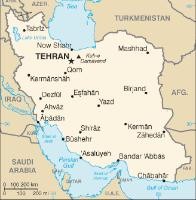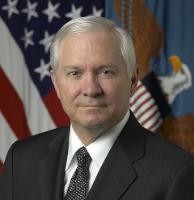According to the WaPo, President-elect Barack Obama is prudently withholding comment on the escalation in the Israel-Hamas conflict, since there’s really nothing to gain and everything to lose by wading into those waters. For some reason, I manage to avoid mentioning the Israeli-Palestinian conflict in calmer times, but feel compelled to weigh in when things get worse, which among other things helps explain why Obama’s resting up in Hawaii in anticipation of assuming the presidency, and I’m, well, not in Hawaii and not anticipating assuming the presidency anytime soon. But without trying to offer a unified field theory or provide […]
Middle East & North Africa Archive
Free Newsletter
In a post earlier today, I disagreed with a point Shadi Hamid made about the inherent stability of democracies’ foreign policy. But I consider him to be one of the sharpest analysts out there. In fact, I recently included him in response to a query about the best “up and coming” defense and foreign policy analysts. To get a sense of why, read his explanation (via Dan Drezner) of the strategic calculations behind Hamas’ decision to escalate its rocket attacks, knowing they would provoke a massive Israeli response. Short version: Sometimes rational calculation is expressed through apparently irrational actions.
Laura Rozen passes on some analysis on background from a “well known Arab American analyst” on the broader strategic stakes of the Israel-Hamas escalation that’s worth reading, especially in light of this, from Marc Lynch (a.k.a. Abu Aardvark), on the high anxiety sweeping through Jordan’s royal family. Setting aside who’s right, for a moment, to concentrate on who’s making sense, I have trouble understanding how anyone can believe Hamas might be defeated militarily, mainly because, like all asymmetric adversaries, Hamas begins at a point already beyond military defeat. Its only hope is to provoke conflict in the hope that it […]
Comparing Iraq’s ambitions to play a regional role — similar to that of Turkey — with Egypt’s relative irrelevance, Shadi Hamid at Democracy Arsenal concludes that democracies are capable of more stable foreign policies than dictatorships, especially those propped up by foreign support. Without disputing the nature of the Mubarak regime, I’m not so sure that Egypt is as irrelevant as Hamid suggests. After all, the Israel-Hamas ceasefire was negotiated via Egyptian mediation. The distinction Hamid makes regarding externally imposed dictatorships (e.g. Egypt) and indigenous ones (e.g. China) might also apply to democracies, given the nature of Baghdad’s dependence on […]
It often seems as if the Israeli-Palestinian conflict exists to serve as a constant reminder that things can always get worse. Over the weekend, they did. For those preoccupied with laying blame, there seems to be plenty to go around. Hamas’ decision to celebrate the end of the six-month-long ceasefire with a shower of rockets on Sderot would be a good place to start, were it not for the humanitarian crisis in Gaza that has worsened in plain sight but to the apparent disinterest of the world. The humanitarian crisis is a result of the Israeli blockade, which in turn […]

GLOBAL EFFORT ON BEHALF OF DETAINED CHINESE DISSIDENT — Over 160 Nobel laureates, writers and academics sent an open letter to Chinese President Hu Jintao via the internet last week urging him to release intellectual Liu Xiaobo, who was taken from his home by security officers Dec. 8 and has not been heard from since. Liu, a literary critic and head of the Independent Chinese PEN Center that advocates for free speech, was a leading signatory and mover behind the document, “Charter 08.” The charter was a public call for greater reform and accountability of the Chinese Communist Party, including […]
A quick followup to my earlier post in defense of undue pessimism. According to the common wisdom, it’s churlish to deny that the Surge in Iraq was successful. And I suppose it was successful if “the Surge” is used to refer to a time period rather than a tactic. But everyone who has followed the Iraq War closely knows that there was a convergence of factors that led to the improved security situation. The increased troop presence and changed tactics associated with the Surge were a prominent one, but it’s impossible to know for sure whether they were determinant. Even […]
I’m not sure why this (AFP via DefenseNews) made me chuckle, but it did: An Iranian warship has entered the Gulf of Aden to protect Iranianvessels against pirates off the coast of Somalia, state radio said onDec. 20. “After traveling morethan 4,000 maritime miles . . . an Iranian warship entered the Gulf ofAden to protect Iranian ships against pirates,” the radio said, withoutfurther details. I like the way the UN, NATO and EU are mounting multilateral missions to secure shipping lanes for international trade, while Iran sends one ship to protect . . . Iranian ships. So now that […]
Whoever’s version you believe about the wave of arrests of government officials in Baghdad, the news is troubling, if not surprising. Either we’re propping up an Iraqi government that faces even more security threats than we realized, or else one that is guilty of ruthless tactics of political suppression. My first reaction to the news that these guys were plotting a coup was that it takes a serious pair to seize power by force in a country where 130,000 American troops are deployed in defense of the currently constituted government. Either that or a nod of approval from the Green […]

PEACE MISSION — According to a soon-to-be published book on the history of U.S.-Vatican relations, President George Bush told an emissary of Pope John Paul II in early March 2003 that Jesus was guiding him in deciding whether to invade Iraq. Cardinal Pio Laghi, a senior Vatican diplomat, had come to Washington with a last-minute appeal from the pope to avert an American attack on Iraq. According to the cardinal’s own account, quoted in “Parallel Empires: The Vatican and the United States — Two Centuries of Alliance and Conflict,” his meeting with Bush in the Oval Office began with the […]
WPR’s World Citizen, Frida Ghitis, called my attention to this AP report on recent polling in Israel. Benjamin Netanyahu’s Likud, after a recent surge, has lost quite a bit of ground, and while still ahead of Tzipi Livni’s Kadima party, only leads by what amounts to four Knesset seats. It seems to me that a weak Netanyahu victory would probably be the worse possible scenario, since as Frida pointed out in her column last week, he had been making a pitch towards the moderate center. A bare margin victory would increase the leverage of the far-right parties he’d need to […]

With 2008 drawing to a close, I decided to look back at the year’s columns and update some stories where important developments have occurred. The stark, if obvious, realization arising from this review is that world politics is shaped by people — people of all kinds: smart, stupid, brave, crafty, or cowardly. But behind every movement, trend and event stand individuals, whose actions shape the course of history. We can easily lose sight of that fact when we focus on the larger picture of global events. In places such as Yemen, Iraq, Israel, and beyond, history-makers do not stand still. […]
Via today’s WPR Media Roundup, I noticed this ME Times item about the UAE agreeing to buy into a U.S. missile shield network in the Gulf. It’s an interesting deal, not least because it comes fast on the heels of the completion of negotiations on the U.S.-UAE nuclear energy deal a few days back (which I mistakenly said had been signed). But it also allows the Emirates to operate the system themselves, which is a significant transfer of training and know-how. So there’s a lot of quid here, but also a lot quo, and it’s hard to tell who got […]
Cutting through all the chatter regarding the symbollism of the shoe in Iraqi culture and the Arab world at large, Kal over at the Moor Next Door gets my vote for insight of the day: Is there a culture in which throwing a shoe at someoneis not highly offensive? The consensus would seem to be that in mostcultures, throwing a shoe at someone at very least signals greathostility. If this incident becomes an iconic one, and I have a suspicion it will, it will be in large part because of the way it took everyone, including the Secret Service, by […]

As President-elect Barack Obama’s national security team prepares to take office in January, the Turkish government is readying to outflank the U.S.’s Iran policy on a vast scale, having signed a milestone agreement in November to invest $12 billion in Iran’s energy sector. The move presents an immediate conflict between Washington’s efforts to contain Iran’s nuclear ambitions and its desire to wean Europe from Russian energy dependence. As a result, the Obama administration will be forced to choose between overhauling American efforts to isolate Iran or inviting a sour demonstration of America’s waning influence among close allies. As part of […]

Earlier this month, the Pentagon issued a directive (.pdf) raising “irregular warfare” (IW) to the same level of importance as conventional battles. The December 2008 directive defines IW as operations to fight terrorists and insurgents, enhance the defense capacity of foreign governments, and promote stability in conflict-prone regions. It asserts that it is now Department of Defense policy “to recognize that IW is as strategically important as traditional warfare.” Although the U.S. armed forces have long performed these tasks, most recently in Afghanistan and Iraq, the military has often done so only with great reluctance. The Pentagon developed considerable expertise […]
The first freelance article I wrote for WPR back in February of this year was on Nicolas Sarkozy’s zeal, upon taking office, in pursuing nuclear energy agreements with the Arab world. While the deals were commercially lucrative and made for some awkward moments (i.e. Muammar Qaddafi’s pitching his Bedouin tents in Paris), the strategic logic was compelling: Sarkozy’s decision . . . reflects astrategic calculation designed to counter Iranian claims that the Westis unwilling to share civil nuclear energy with the Arab world. Asa French official who agreed to speak with World Politics Review oncondition of anonymity put it, “It’s […]
